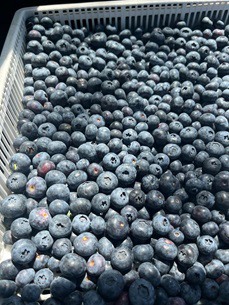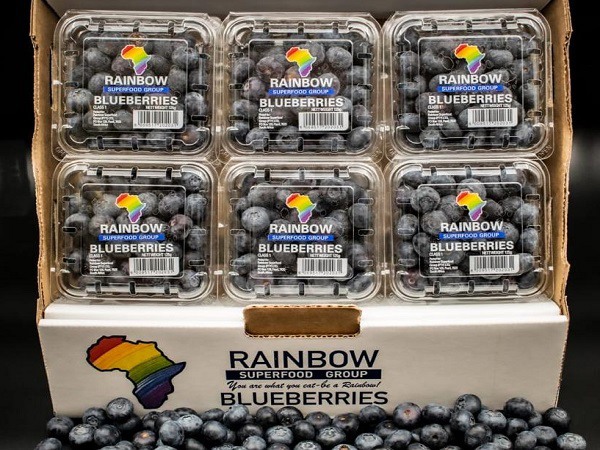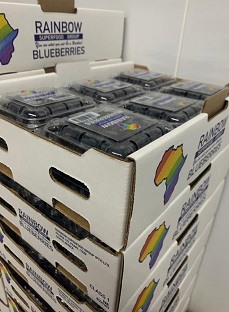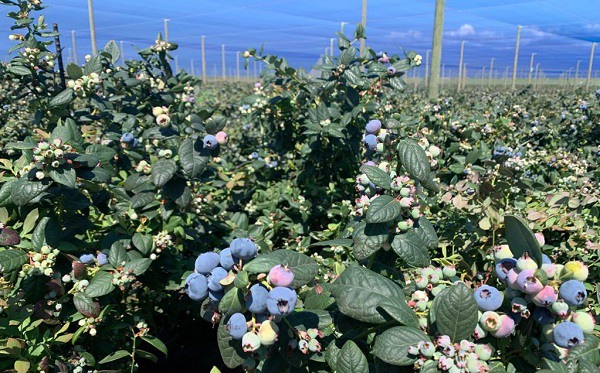 “You get to know blueberry trends but this year I had to throw my blueberry marketing manual, with all the trends and the statistics, out the door,” says Tiaan Rossouw, managing director of Rainbow Superfood, a berry exporter.
“You get to know blueberry trends but this year I had to throw my blueberry marketing manual, with all the trends and the statistics, out the door,” says Tiaan Rossouw, managing director of Rainbow Superfood, a berry exporter.
Exactly a year ago Tiaan told FreshPlaza that he didn’t know how farmers would survive.
He remarked then that the price could probably never go lower than it was during 2022/2023 – this year, they’ve been thrown a lifeline by the significant reduction (up to 65%, some say) in Peruvian blueberries.
“Peru does ten times our volume so it’s fantastic for us. We really really needed it. I have sympathy for them but our farmers really got a hiding the past two years and South African farmers get no government subsidy to help them out.”
He continues: “We can’t do it as cheaply as Peru and last year many farmers were at breaking point. It’s nice to be able to give farmers a price that will help them get out of debt. It had been a horrible two years for blueberry farmers.”

"This year I couldn’t have predicted in my wildest dreams.”
Trading market replaces fixed programmes
It’s a trading market this year where usually fixed programmes were the way to go on blueberries in Europe and the UK.
“I see prices were stabilizing, but it’s been 40%-70% better than last year. This year I couldn’t have predicted in my wildest dreams.”
Usually prices in Asia are stronger but this year, Tiaan remarks, Europe has regained some ascendancy.
“Prices justify airfreight at supposed lower quality risk and faster returns traditionally.”
“We have to keep flying out when we should’ve started shipping.” Usually they’d like to switch to seafreight but shipping is – again – of huge concern to South African exporters and importers.
Usually they’d like to switch to seafreight but shipping is – again – of huge concern to South African exporters and importers.
He has just learned, Tiaan says, that a consignment he had promised a receiver is now slated to arrive a whole month later due to changes that shipping lines are making to avoid calling at Cape Town, for instance replacing it with Mauritius as Maersk has announced it intends to do.
“I had to tell the packhouse to stop packing. This is the kind of thing that loses you a client. I’ve never flown out as much product in my life. It feels like I’m not an exporter anymore, I’m a logistics agent."
The problems at the ports mean that stonefruit and litchis also compete for air freight space to Europe.
Airfreight, alas, no guarantee against claims
“What’s bad is that airfreight temperatures are being managed worse and worse. There’s a spike to 15°C up to 22°C, then often there are stopovers where it’s up to 8 hours on the tarmac and temperatures can get up to 40°C. It’s not a new thing but it feels to me like there’s more negligence from airfreight companies. They are taking advantage of the situation at the moment, I feel.”
In his opinion fourteen days on a ship is safer than airfreight and he tells how he has flown blueberries to the Middle East, followed by a shipment – and then getting a claim on the airfreight fruit while the seafreight fruit is in excellent condition.
“If only shipping lines can restore some confidence by getting their act together. A lot of water still needs to run into the sea. I have been exporting berries from farms in KwaZulu-Natal and in the north, and 80% of my own farm’s volumes still need to come in. We pack until the middle or the end of January.”

He observes that the blueberry export crop from the north was markedly down when fruit took very long to colour up, but the fruit he received looked genuinely good.
“It was a really successful season for the growers up north, it’s just that volumes were down. Buyers are expecting fruit to come from Chile, but early rain damage in Chile and a late harvest should most likely mean the South African season will end strong.” For more information:
For more information:
Tiaan Rossouw
Rainbow Superfood
Tel: +27 61 586 5047
Email: tiaan@rainbowsuperfood.com
https://rainbowsuperfood.com/home/
